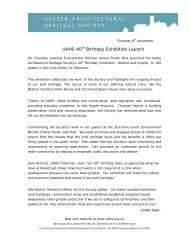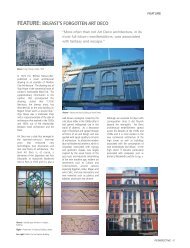Directory of Traditional Building Skills - Mourne Heritage Trust
Directory of Traditional Building Skills - Mourne Heritage Trust
Directory of Traditional Building Skills - Mourne Heritage Trust
You also want an ePaper? Increase the reach of your titles
YUMPU automatically turns print PDFs into web optimized ePapers that Google loves.
2 ROOFING – SLATING, TILING AND THATCHThatch is the traditional ro<strong>of</strong>ing material <strong>of</strong> Ireland and was almost universal in modest housesuntil the mid nineteenth century. Locally available split stone or slate was used but it was notuntil the widespread availability <strong>of</strong> cheap Welsh slate that the major changes occurred. Slaterequired little maintenance, was easily worked, attractive, and remained the main ro<strong>of</strong>ingmaterial until very recent times. Widespread use <strong>of</strong> clay and concrete tiles has surpassed theuse <strong>of</strong> slate but it remains the best material for repairs and extensions to old buildings.Thatch has declined alarmingly – there are now fewer than 150 inhabited thatched buildings inNorthern Ireland. Concern is so great for their survival outside museums that the Environmentand <strong>Heritage</strong> Service are <strong>of</strong>fering 75% grants towards thatching and maintenance. Oldproblems <strong>of</strong> damp and mould are easily solved today and while regular maintenance is requiredthe benefits <strong>of</strong> beauty and character plus the grant available can swing the financial balance.There has been a great revival <strong>of</strong> interest in thatching in Britain and this is spreading toNorthern Ireland. Thatchers are now more easily found and there is no doubt that the craft willdevelop with the revival <strong>of</strong> interest in thatching.Natural slate is also enjoying a revival and with the high cost <strong>of</strong> new slate a market led demandfor salvaged slate has emerged. When re-ro<strong>of</strong>ing is necessary careful choice is required toavoid a patchwork quilt <strong>of</strong> blues and greys as there are considerable differences in colour. It iswise to avoid mixing slates from different sources so the original ones should be kept togetherand used on the most prominent elevations. Delaminated slates or ones with splits or overlargenail holes should be discarded. Variations in detail in the ro<strong>of</strong>scape such as rows <strong>of</strong> particularlylarge slates at the eaves, called queens, diminishing courses, that is slates getting graduallysmaller towards the ridge, and the ridge materials (stone, clay or lead) are <strong>of</strong> immenseimportance to the character <strong>of</strong> the building and should be retained. It is vital to check ro<strong>of</strong>sregularly for slipped or missing slates and to repair promptly.Westmoreland or Norwegian green slates were popular in Ireland in the inter-war years and itis still possible to get new slates to match. Clay tiles are a very old ro<strong>of</strong>ing material rarely foundin Northern Ireland until modern times when the ‘Rosemary’ small plain tile became popular.Cedar shingles enjoyed a brief boom in the 1950s but in general have not fared well in thedamp climate.In general natural slate ro<strong>of</strong>s should have a minimum <strong>of</strong> 35° pitch, rising to 45° or greater forsmall slates. Where it is not possible to lay natural slate, a different material such as lead shouldbe used.Finally, painted corrugated metal sheeting is a traditional ro<strong>of</strong> in the country, mainly over barnsand out-buildings, but <strong>of</strong>ten over the top <strong>of</strong> thatch on houses. Black, green or red lead are thecommon colours and their use should be considered on all rural building groups.See also Section 3 Leadwork (for flashings) p. 82Section 11 Remedial works (for chimneys) p. 126Appendix 1: Further reading p. 14977











